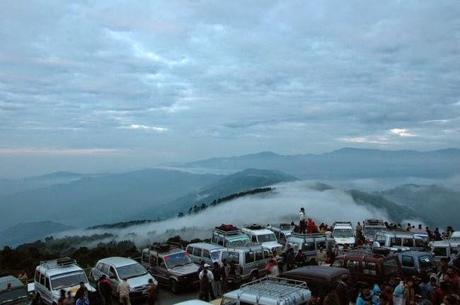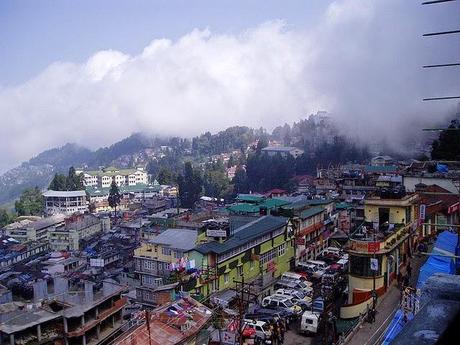 Darjeeling orginally known as Dorjeeling is one of the most profound hill stations
not only in India but in the whole world. Located in the eastern state of West Bengal this hill station has been crowned as the “Queen of Hills” by the erstwhile British rulers of India. The hill station is known far and wide for its breathtaking scenic beauty, picturesque landscapes, tea gardens, adventure sports, nature trails and its magnificent weather conditions.
Darjeeling orginally known as Dorjeeling is one of the most profound hill stations
not only in India but in the whole world. Located in the eastern state of West Bengal this hill station has been crowned as the “Queen of Hills” by the erstwhile British rulers of India. The hill station is known far and wide for its breathtaking scenic beauty, picturesque landscapes, tea gardens, adventure sports, nature trails and its magnificent weather conditions.Being located a height of 6710 ft. above sea level provides it one of the most pleasant weathers in the hot country of India. However it is not only the altitude that plays a role in the terrific Darjeeling weather, the mountain ranges, adjoining hills and the forest cover too play a major role in it.
The weather here is a highly unpredictable one and can change anytime. At one instance you may be enjoying a bright sunny day with all the scenic beauty on the horizon at display and in the next a dense fog may come sweeping in blotting out the sunshine. The showers of rain too are also very uncanny here, the sky may be dense with dark clouds that are pregnant with moisture and you expect a heavy shower later in the day but it might not even rain for days. Fog however is almost a signature for the “Queen of Hills”, the way it settles in is a mesmerizing sight and one ought too take notice of this in Darjeeling. The valleys of the hills are humid are give rise to the fog that blankets the hill station in a shade of gray. This particular phenomenon is a grand one and will surely mesmerize the one who takes notice of it from its origins. The fog rises from the valleys below thick and fluffy as if it were cotton candy being made. Slowly it appears to move uphill swallowing everything it comes across, bit by bit the valleys beign to disappear and in just minutes one can feel moisture laden breeze blowing by slowly engulfing the place that one has been witnessing the conjuring of the fog from the valleys deep below. Rain too is a common a phenomenon that occurs in Darjeeling and it is usually accompanied by thunder. It is this thunder that is so profound and loud that gave the hill station its original name “Dorjeeling” meaning the land of thunder.One of the best sights that you get to see when here are the clouds, one can see them both in the sky and the valleys below. This kind of phenomenon is seen only in a few places on earth and is one of the most pensive sights that will remain vivid in your memories. The climatic seasons has been broken down in the hills into spring, summer, monsoon, autumn and winter but the weather hardly follows this classification.
 The spring season is a short lived one and lasts about a month from March to April. This season is one of the best times to visit the hill station as it holds promises of bright clear days where you can take in all of the scenic beauty from the snowy mountain clad horizons to the lush green valleys below.
Summer season is believed to last from May to June and these months are usually hotter than the other one. The temperatures range from 11-20 degrees and makes a good time for outings but one should carry a small umbrella for occasional showers do happen.
By the first week of June monsoon sets in and when it rains it can do so for days continously. The monsoons are expected to end by the end of August but sometimes it lasts till the first week of October.
Autumn sets by the end of September and this is a dry windy season for the hills making it one of the best times to visit. This season lasts till November and then the winter sets in.
The winters are cold with temperatures dropping to even -4 at times. Snowfall is not so common at present days due to the urbanization but if you are lucky you might be there when it does. This season lasts till end of February and is a time when there are lot of tourists coming in to enjoy the chill of the hill.
However whatever be the case do not judge the weather here by the sky because as they say the three W’s of Darjeeling should not be trusted and one of them is the “Weather”.
The spring season is a short lived one and lasts about a month from March to April. This season is one of the best times to visit the hill station as it holds promises of bright clear days where you can take in all of the scenic beauty from the snowy mountain clad horizons to the lush green valleys below.
Summer season is believed to last from May to June and these months are usually hotter than the other one. The temperatures range from 11-20 degrees and makes a good time for outings but one should carry a small umbrella for occasional showers do happen.
By the first week of June monsoon sets in and when it rains it can do so for days continously. The monsoons are expected to end by the end of August but sometimes it lasts till the first week of October.
Autumn sets by the end of September and this is a dry windy season for the hills making it one of the best times to visit. This season lasts till November and then the winter sets in.
The winters are cold with temperatures dropping to even -4 at times. Snowfall is not so common at present days due to the urbanization but if you are lucky you might be there when it does. This season lasts till end of February and is a time when there are lot of tourists coming in to enjoy the chill of the hill.
However whatever be the case do not judge the weather here by the sky because as they say the three W’s of Darjeeling should not be trusted and one of them is the “Weather”.
